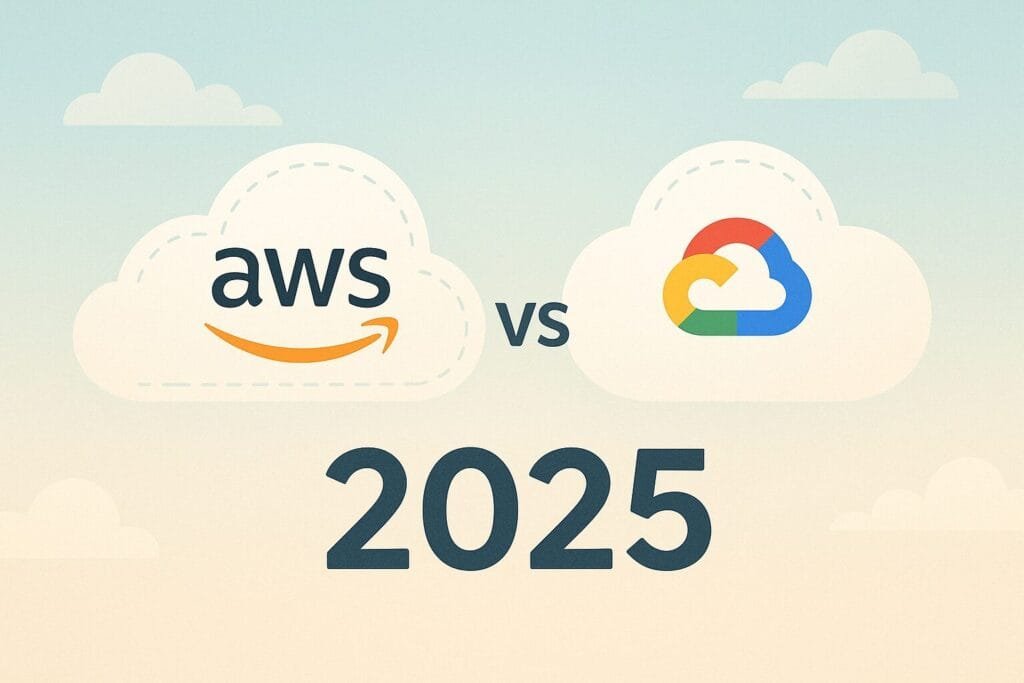In the rapidly evolving cloud computing industry, AWS vs Google Cloud remains one of the hottest debates in 2025. Both Amazon Web Services (AWS) and Google Cloud Platform (GCP) dominate the market alongside Microsoft Azure. Businesses, developers, and enterprises are constantly evaluating which provider offers the best mix of pricing, performance, scalability, and features. In this article, we will take a deep dive into their differences, advantages, and drawbacks to help you decide which platform is the right choice in 2025.

Introduction to AWS and Google Cloud
Amazon Web Services (AWS) is the pioneer of cloud computing, launching its services in 2006. Today, AWS powers millions of businesses with its global infrastructure, offering over 200 services including compute, storage, AI/ML, databases, IoT, and more. AWS is widely considered the market leader in terms of market share and maturity.
Google Cloud Platform (GCP), launched in 2008, is Google’s answer to cloud services. Although it entered later, GCP has quickly gained popularity, especially in AI, machine learning, and data analytics. With Google’s innovation in Kubernetes and TensorFlow, GCP appeals strongly to developers and enterprises focusing on AI-driven applications.
AWS vs Google Cloud: Market Position in 2025
According to the latest industry reports, AWS still leads the global market share in 2025, followed by Microsoft Azure and then Google Cloud. However, GCP has shown significant growth over the last few years, thanks to its competitive pricing and advancements in artificial intelligence tools. Companies that rely heavily on big data and AI often prefer Google Cloud, while businesses seeking robust infrastructure and global scalability lean toward AWS.
Key Differences Between AWS and Google Cloud
Let’s compare AWS vs Google Cloud in 2025 across various aspects, including pricing, services, AI, networking, and developer tools.
| Criteria | AWS | Google Cloud |
|---|---|---|
| Market Share | Still the leader in 2025, widely adopted by enterprises worldwide | Rapidly growing, strong among startups and AI-driven companies |
| Pricing | Complex pricing model, generally higher for long-term use | Competitive pricing, discounts for sustained workloads |
| Compute Services | EC2 instances, Lambda, ECS, EKS with strong ecosystem | Google Compute Engine, App Engine, and Kubernetes dominance |
| AI & Machine Learning | Amazon SageMaker, AI services integrated into many AWS tools | Strong leader in AI with TensorFlow, Vertex AI, and BigQuery ML |
| Data Analytics | Amazon Redshift, Kinesis, and Athena | BigQuery (fast, serverless, and cost-effective) |
| Global Network | Over 30 regions with a strong backbone infrastructure | Fewer regions but extremely fast network due to Google’s fiber backbone |
| Ease of Use | Broad ecosystem, but complexity can overwhelm beginners | Developer-friendly interface, easier for AI and ML projects |
AWS: Pros and Cons in 2025
Pros
- Largest cloud provider with mature services
- Extensive global infrastructure
- Strong hybrid cloud and enterprise adoption
- Wide variety of services for every business need
Cons
- Complex pricing structure
- Overwhelming service catalog for new users
- Costs may be higher compared to competitors
Google Cloud: Pros and Cons in 2025
Pros
- Best-in-class AI and machine learning tools
- Competitive and transparent pricing
- Excellent for startups, developers, and AI-first companies
- BigQuery is one of the fastest data analytics tools
Cons
- Smaller market share compared to AWS
- Fewer global regions
- Some enterprises consider it less mature than AWS
Which One Should You Choose in 2025?
Your choice between AWS vs Google Cloud depends on your priorities:
- Choose AWS if you want the most mature ecosystem, global reach, and enterprise-level infrastructure.
- Choose Google Cloud if your business is AI/ML-driven, you want better pricing, or you rely heavily on data analytics like BigQuery.
Conclusion
In 2025, the debate of AWS vs Google Cloud continues to shape the cloud computing landscape. AWS remains the global leader with a strong presence across industries, while Google Cloud is carving its niche with unmatched AI and data analytics capabilities. Both providers are excellent, but the best choice depends on your business needs and technical requirements.
If you want to dive deeper into cloud computing comparisons, check out Google Cloud’s official website for the latest updates and case studies.

